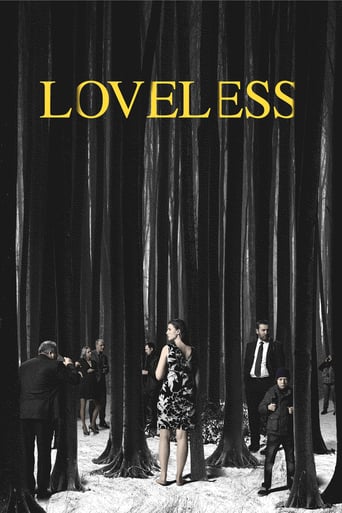artur-artborg
Suppose that you go to the cinema in order to experience breath-takingly beautiful narratives featuring well-rounded, sympathetic characters in pursuit of relatable goals. Or else, suppose that your main motivation for going to the cinema is simply to be entertained by a suspenseful or fun movie.
.
Well, "Loveless" won't scratch either itch. This two-hour snoozefest features some of the most dislikeable characters ever put to screen, making it impossible to care about anyone or anything. The film is full of social critique and political messages, but lacks a raison d'être. It's simple plot is stretched out ad infinitum, making you long for the credits way before you're granted their visage. It is well-shot and well-acted and realistic to a fault, but it only exists to teach the audience of things they already know.
.
Save your money and your time on a movie truly worthy of your time.
CineMuseFilms
The Russian-made Loveless (2018)highlights the different cinematic traditions of the East and Western blocs. In simple terms, the film displays the East's understanding of creative minimalism in contrast to the West's preference for excess: 'less is more' versus 'more is never enough'. Both narratively and in cinematography, Lovelessis a searing ultra-minimalist indictment of Russian society today.We enter the story through the eyes of 12-year old Alyosha (Matvey Novikov) dawdling home from school. He is in no rush as his family life is a battleground between divorcing parents, Zhenya (Maryana Spivak) and Boris (Aleksey Rozin). Most separating parents fight for custody, but these are fighting againstcustody because caring for Alyosha is inconvenient for their new love interests. The 12-year old hears everything and knows he is unwanted. One day, Zhenya learns that Alyosha has missed some days of schooling. She had not noticed, thinking he was with his father while Boris thought the opposite. Police are soon notified and refer the parents to a voluntary missing persons search organisation as Russian police 'do not handle such matters'. The rest of the film follows the detailed search against a background of toxic parental squabbling and scant regard for the fate of their son.The most outstanding feature of this film is the starkly realistic way it portrays emotional shallowness. While Zhenya and Boris displayfeelings expected of parents in their situation, we sense a difference between 'genuine' and 'expected' emotion. Nothing in their words or actions earns our empathy or sympathy. They emote externally but are privately outraged over the inconvenience of the search and the impact on their divorce affairs. Despite its simple title, Loveless is a complex essay about parents incapable of loving their own child who is struggling to survive in a society that stifles love itself.Whether you see Loveless as a statement about modern Russia or a broader essay on contemporary materialism depends on how literally you read the signs. Selfish parents exist everywhere but the film's penultimate scene is unambivalent. Several years after the search, we find Boris repeating history in his loveless handling of new offspring. We see also the self-absorbed Zhenya in an expensive garden apartment with a new wealthy partner, still obsessed with keeping up appearances. She steps onto a high-tech treadmill wearing a tracksuit emblazoned with the single word 'Russia'. Not subtle, but the director's message is unmistakable: in the process of modernisation, Russia has absorbed the worst of the West.In light of Russia's political history, it should not be surprising to see a story in which the disappearance of a human being is so quickly normalised. As a movie, it is too bleak to be entertaining and too tense to be enjoyable. But it is certainly an engrossing and disturbing glimpse behind today's translucent iron curtain.
Ivan Lalic
Russian candidate for this year's foreign "oscar" is a typical European hard to watch and almost empty European kind of dramas, directed by the presently best director of the largest country in the world, Andrey Zvyagintsev.
Naively praised in the West as a portrayalist of a stark and bleak life in Russia at the beginning of the 21st century, Andrey managed to film yet another universal movie story that everybody can relate to, painting the emptiness and absence of any kind of emotion for our youngest.
Fanatically persistent in his empty shots, Zvyagintsev used two brilliant movie rookies and told a frightening script about selfishness and vanity that consequently lead to tragedy.
If you are into real life stories and problems and have no problem with slow pace movie scripts, you should definitely watch "Loveless".
maurice yacowar
The opening and closing montages - barren skeletal trees in a grey frozen wasteland - set the film's emotional tone. As you may (or not) infer from the title, this is a loveless family.
Zhenya felt no love from her still venomous mother. To escape her she married Boris, the man she didn't love but who impregnated her. Zhenya still resents her 12-year-old son Alyosha and his father. Zhenya and Boris occupy the same apartment as they plan their divorce. Neither wants Alyosha, s troubled, predictably insecure boy, so they plan to send him to an orphanage.
Zhenya and Boris are already deep in new affairs. They are reunited in rage and mutual recrimination when Alyosha disappears.
His mystery is never solved. He remains only that streamer still fluttering in the dead tree to which he launched it. Like the boy, it's a fragile wisp of life and colour once rejected, still haunting.
Zhenya, ensconced in her luxurious new lover's flat, may be trying to erase his memory as she stolidly runs on her out door treadmill, in her "Russia" sweats. Her sweaty desperation may be emotional, not physical.
Boris has a new wife, another suffocating family life, another irritating infant son. He may indeed be fulfilling his new love's prediction - that he'll dismiss his second love and family as he did his first.
Both parents are jolted out of their complacency when they see the horrible remains of a young corpse that might have been their Alyosha but isn't. It's perhaps the only moment we can feel empathy for them. Till we see Zhenya's response, to assault Boris.
The film provides some humane - if not comic - relief. The central family's loathsomeness is countered by some astonishing kindness and care. Alyosha's young friend is an impressive kid, faithful but caring. His father shows more natural affection than either of Alyosha's parents or his granny did. The loveless are not the film's only family.
The police are ... The State. Brusque, officious, they are only as considerate as they can take the time and effort to be. But they do direct Zhenya to a genuinely impressive human community, the horde of volunteers who have trained themselves to seek, to recover and to care for whoever has disappeared. These volunteers embody the lost ideal of socialism, of human collaboration. Boris and Zhenya resist their example.
As in his Leviathan, director Andrey Zvyagintsev provides a scathing view of contemporary Russian life. If the volunteers are a proper, responsible human community, the other characters in the background are idle flirts, drunks and partyers with no accountability or commitment. A pretty young woman on a dinner date freely gives her phone number and name to an unseen jerk who asks for it. Between these ditzes and the selfish central family Russia has lost its humanity.
The TV background news amplifies this theme. Initially the news is about Russian political arguments and jockeying. But at the end it reports the horrors of the Ukrainian civilians suffering under Russian attack. The woman articulates an anger and sense of abandonment that little Alyosha's silent scream could only suggest,




